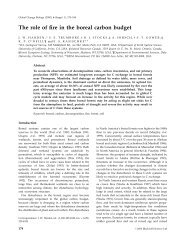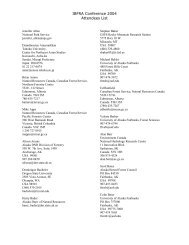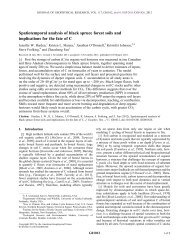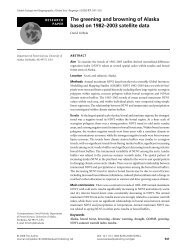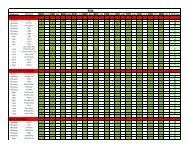Chapin, F.S., III, M.D. Robards, H.P. Huntington, J.F. Johnstone, S.F. ...
Chapin, F.S., III, M.D. Robards, H.P. Huntington, J.F. Johnstone, S.F. ...
Chapin, F.S., III, M.D. Robards, H.P. Huntington, J.F. Johnstone, S.F. ...
Create successful ePaper yourself
Turn your PDF publications into a flip-book with our unique Google optimized e-Paper software.
F. S. <strong>Chapin</strong> et al., Directional Changes in Ecological Communities<br />
02/26/2007 07:26 AM<br />
of crisis, when they can change rapidly. These moments of crisis provide windows of opportunity to<br />
formulate new policies that alter social-ecological feedbacks in ways that can either augment or reduce<br />
human impacts on communities (Walker et al. 2004).<br />
Similarly, protected areas based on historic ranges of key wildlife species are often established with the<br />
expectation that the current location is the ideal site for their future conservation. Directional changes of<br />
climate may, however, make today's critical habitat areas (e.g., caribou calving grounds or terrestrial walrus<br />
haulouts) unsuitable in the future, leading to a spatial disconnect that results in ecological loss. Conservation<br />
planning increasingly recognizes the need to consider both the current habitat requirements of organisms and<br />
the necessity for shifts in critical habitats and corridors that allow future migration to new locations where<br />
future environmental conditions make that habitat more suitable (Elmqvist et al. 2004).<br />
Temporal and spatial disconnects (hypotheses 4 and 5) can also contribute to institutional rigidity<br />
(hypothesis 6) that restricts adaptive change. A frequent response to a decline in fisheries, for example, is to<br />
restrict the number of fishing vessels, which creates incentives for a capital-intensive fishing fleet that is<br />
more efficient in catching fish and increases the likelihood of fishery collapse. These policies often favor<br />
nonlocal fishing ventures and have not supported the social health of local communities that rely on the<br />
fishery, as has occurred, for example, in Bristol Bay, Alaska (NRC 2004).<br />
Managers and the public are not easily convinced that the future will be substantially different than the<br />
past, especially when there is high variability or uncertainty, so it is usually difficult to implement policies<br />
that respond in an appropriate and timely manner to directional environmental changes. This indicates a key<br />
role for public education in policy change.<br />
Hypothesis 7. Institutions that strengthen negative feedbacks between human actions and socialecological<br />
consequences can reduce human impacts through more responsive (and thus more effective)<br />
management of common-pool resources. Hypothesis 7 shifts our discussion squarely into the human<br />
dimension by focusing on the performance of social institutions (formal and informal rules of decision<br />
making). This hypothesis provides one potential solution to problems that arise from the conditions<br />
described in hypotheses 4–6.<br />
Many natural resources harvested by society are "common-pool," or shared, resources (Ostrom 1990). In<br />
the absence of effective rules for managing common-pool resources, there can be strong pressures to harvest<br />
more resources than the ecosystem can sustain, leading to significant ecological degradation (Hardin 1968).<br />
Economic and political forces can foster the maximization of short-term profit, often overlooking the longterm<br />
ecological consequences (hypothesis 4). Institutions that are well defined and responsive to change can<br />
function as negative feedbacks to avoid such tragedies.<br />
Historical changes in common-pool institutions in the James Bay region of Canada exemplify the role of<br />
institutions in social-ecological feedbacks. Beaver were a traditional source of food and furs for Cree<br />
file:///private/var/tmp/folders.501/TemporaryItems/com.apple.mail/compose/attach/<strong>Chapin</strong>2006AmNat.webarchive<br />
Page 13 of 21



